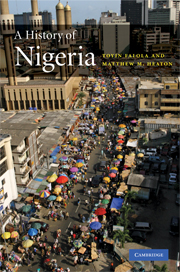Book contents
- Frontmatter
- Contents
- List of illustrations
- List of maps
- Acknowledgments
- Chronology
- Notable people in Nigerian history
- List of abbreviations
- Glossary
- Map 1 Major cities and ethnic groups in present-day Nigeria
- Introduction
- 1 Early states and societies, 9000 BCE – 1500 CE
- 2 Slavery, state, and society, c. 1500 – c. 1800
- 3 Political and economic transformations in the nineteenth century
- 4 Transition to British colonial rule, 1850 – 1903
- 5 Colonial society to 1929
- 6 Nationalist movements and independence, 1929 – 1960
- 7 Instability and civil war, 1960 – 1970
- 8 Oil, state, and society, 1970 – 1983
- 9 Civil society and democratic transition, 1984 – 2007
- 10 Nigeria and Nigerians in world history
- Concluding remarks: corruption, anti-corruption, and the 2007 elections
- Notes
- Selected bibliography
- Index
1 - Early states and societies, 9000 BCE – 1500 CE
Published online by Cambridge University Press: 05 June 2012
- Frontmatter
- Contents
- List of illustrations
- List of maps
- Acknowledgments
- Chronology
- Notable people in Nigerian history
- List of abbreviations
- Glossary
- Map 1 Major cities and ethnic groups in present-day Nigeria
- Introduction
- 1 Early states and societies, 9000 BCE – 1500 CE
- 2 Slavery, state, and society, c. 1500 – c. 1800
- 3 Political and economic transformations in the nineteenth century
- 4 Transition to British colonial rule, 1850 – 1903
- 5 Colonial society to 1929
- 6 Nationalist movements and independence, 1929 – 1960
- 7 Instability and civil war, 1960 – 1970
- 8 Oil, state, and society, 1970 – 1983
- 9 Civil society and democratic transition, 1984 – 2007
- 10 Nigeria and Nigerians in world history
- Concluding remarks: corruption, anti-corruption, and the 2007 elections
- Notes
- Selected bibliography
- Index
Summary
INTRODUCTION
This chapter discusses the early history of human habitation and the development of states in the territories of modern-day Nigeria, from the period of the earliest archeological findings in the Late Stone Age (LSA) to the coming of European traders in the late fifteenth and sixteenth centuries CE (Common Era). Archeological evidence indicates that human societies have been constantly present in all regions of Nigeria for several thousand years. Initially, their societies were decentralized in nature, focusing on small village or village-group units. Some societies, particularly in the eastern and middle belt regions of modern-day Nigeria, maintained these decentralized state structures until the advent of European colonialism. By the end of the first millennium CE, however, some societies were developing more centralized state structures, based on ideas of kingship and drawing greater resources to urban centers of political, economic, and cultural importance. In the southern, forested region, the largest of these centralized states were the kingdoms centered on Ile-Ife and Benin. In the Sahel region in the north, the empires of Kanem and Borno became increasingly powerful from the eleventh century CE, with Hausa states such as Kano, Katsina, Zaria, and Gobir beginning their ascendancy by the fifteenth century.
Both the centralized and the decentralized states had their roots in the agricultural economies of indigenous African communities, although the goods and ideas brought into these societies by immigrants often made significant marks on the politics, economies, and cultures of these states and societies.
- Type
- Chapter
- Information
- A History of Nigeria , pp. 16 - 38Publisher: Cambridge University PressPrint publication year: 2008



